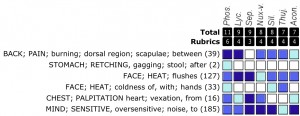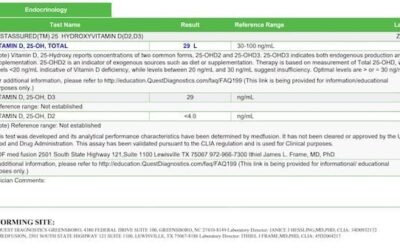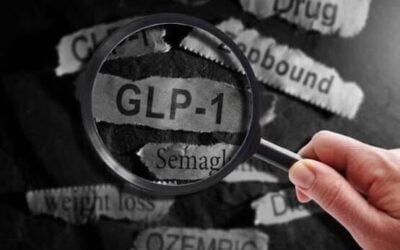Tara Peyman, ND
When I first learned about homeopathic medicine, it was very tempting to form stereotypes about the remedies, and to think of each medicine as if it is good for a certain type of person. For example, weepy, needy, sensitive people might respond well to Pulsatilla; irritable, impatient, critical people might respond well to Nux Vomica. It is so easy to think of the remedies almost as if they are people, with personality traits and associated symptoms. Then, when a patient comes to see us for treatment of a serious illness, we might fall into the habit of seeing the patient as a “Sulphur type” or a “Lycopodium type,” and prescribing a homeopathic remedy based on the personality, rather than on the real symptoms of the person’s disease.
The longer I practice, the more I recognize that this way of thinking about homeopathic medicine is not what will serve our patients best. Because my practice is focused in mental health, I started out by focusing on the mental symptoms of my patients. This was certainly where I expected to find the most helpful symptoms in analyzing a case of psychiatric illness. Thanks to my teachers and mentors, as well as years of witnessing what works and doesn’t work, I have learned to redirect my attention to the physical symptoms of my mental health cases, in order to get the best results.
Why Physical Symptoms Can Be Our Best Guide
The body doesn’t lie. The emotional symptoms of anxiety or depression are usually vague and generalized, making it difficult to find a single homeopathic remedy that is the perfect match. The more materia medica I read, the more I realize that almost every remedy can produce mental depression or anxiety, and that these symptoms are often very similar between the hundreds of remedies in our materia medica. The physical symptoms that patients experience during their mental distress can often be a better guide to the correct homeopathic medicine than their mental symptoms might seem to be.
In taking a case of schizophrenia, the mental symptoms might seem particularly interesting and unusual at first, such as delusions of persecution or laughing spontaneously. However, these symptoms are, in fact, part of the diagnostic criteria for the condition, and therefore are not guiding symptoms at all. In treating suicidal depression, you might be inclined to try a remedy like Aurum metallicum because it best covers the intensity of suicidal sadness, according to the repertory and materia medica. But if we don’t pay attention to the physical symptoms of the case, we might miss the 1 key factor that leads us to the right medicine for a patient.
Don’t get me wrong; mental symptoms can absolutely be unique and useful. We want to take in every part of the case – emotional, cognitive, and physical symptoms – in order to truly understand and treat our patients. In a case of mental illness, sometimes the mental symptoms do provide enough characteristic features to identify the homeopathic remedy that will be curative. Yet I see more cases where it is the physical symptoms that lead me to the remedy that finally acts in a curative way.
Case Study 1
A 42-Year-Old Female with Bipolar I Disorder
Jennifer first presented in a hypomanic state after a psychotic manic episode. I treated her hypomania with Stramonium, and then she fell into a depressive episode several months later, and needed a change in her treatment plan. When she was at her worst with depression, she wanted to be left alone. She was isolating, and not answering phone calls or text messages. She was exhausted and wanted to sleep all the time. She was irritable and dwelled on her ex-husband’s rude behavior in their past encounters. She would sometimes want to lash out violently; she had once punched a wall when she thought about him. She felt indifferent to everything, and disliked talking to her friends about anything at all. Talking would make her uncomfortable, and she would rather be quiet and alone. Based on these symptoms, I gave homeopathic Natrum muriaticum, which did not help. I tried Staphysagria, which did nothing. I gave Ignatia. Again, nothing.
I was considering Aurum metallicum, but instead I decided to delve deeper into every symptom she was experiencing. During this process, I found that she had numbness of her lower legs after sitting for a few minutes. She didn’t think to tell me this because it was not the main thing that troubled her. She also had mild headaches ever since the depression started. With the headaches, she felt mild pressure and heaviness in her occiput that was worse on stooping forward, and better on leaning her head backward. These 2 symptoms led me to a new medicine that completely relieved the depression.
In Allen’s Encyclopedia, I found the following description:
Falling asleep of the lower extremities, while sitting. Heaviness and pressure forward in the occiput on bending the head forward, disappearing on bending it backward. He speaks unwillingly; talking is irksome. Constant fretfulness, with disinclination to talk. Easily vexed and easily gets into a passion. Very ill-humored, peevish, irritable. Discontented with himself, reproachful. Very irritable depressed mood, with physical prostration.
This is from the materia medica for Phosphoric acid.
I gave Jennifer Phosphoric acid 6C, 2 pellets daily, and her depression finally lifted; she went into remission. Had I not focused my attention on the physical symptoms of the case, I would not have found my way to the remedy that could truly help her.
Case Study 2
A 19-Year-Old Male with Major Depressive Disorder
Kevin had cycles of irritable depression since he was about 15 years old, right after his parents got divorced and he moved to a new school. At the time, he felt alone and afraid. As he went through his teenage years, he would frequently get angry and act out in aggressive ways from the slightest provocation.
On presentation to my office, he was in a severe depressive episode with suicidal thoughts. He could not stop thinking about killing himself. He thought about it multiple times per day. At night, he would lie in bed and think about ways to commit suicide, but the thought of death frightened him enough that he couldn’t bring himself to act on those thoughts.
The irritability was very pronounced in the worst of the depression. Anything that anyone said seemed to upset him. He told me, “It’s like I have no skin and everything just irritates me.” Noises and bright lights annoyed him. During anger, he would get flushes of heat in his face, and coldness in his hands and feet, with a racing heart.
I asked about other physical symptoms. He was tired all the time, and had non-specific aches and pains in his muscles that were worse from oversleeping during depression. He described feeling nauseated very easily, and gagging and retching in the mornings, especially. The nausea and retching was always worse immediately after he had a bowel movement in the morning. During the nausea, he felt a hot, pulsing, aching sensation in his back, between his shoulder blades.
These physical symptoms guided me to a remedy that I would not have immediately considered otherwise: Phosphorus (see Figure 1). In Hahnemann’s Chronic Diseases, on the remedy Phosphorus, one of the lines reads: “After the stool, sour vomiting, or at least retching, for several mornings.” In Hering’s Guiding Symptoms, he describes another symptom of Phosphorus that matches our case: “Between scapulae: heat, pains, burning pain, dull pain, throbbing pain in small spot, throbbing burning distress.”
Figure 1. Analysis
The patient’s mental state was also covered by Phosphorus. From Allen’s Encyclopedia, we can read some of the mental symptoms of Phosphorus as follows:
As the darkness of night began to in-close the earth, my peace was disturbed by the most frightful visions and thoughts; constant fear of death, with an almost uncontrollable desire to commit suicide. Mental irritability, uncommon vehemence in argument. Felt exceedingly petulant all day; nothing went right; felt as dissatisfied with myself as with others; seemed as if everybody said or did something to provoke me. Very much affected, even by a slight vexation. Vexation causes violent anger and rage. Great vexation from the slightest cause, with cold hands, hot face, and palpitation.
Is this the “Phosphorus personality” that we think of stereotypically? Not at all. Most people think of sweet, sympathetic, gregarious personality traits when they think of Phosphorus. Yet, the real materia medica of Phosphorus shows us that there is so much more depth than this. If I had given a remedy based on his mental symptoms alone, I would probably have given Nux vomica, or possibly Belladonna. Yet Phosphorus cured the case because it was the only remedy that could treat the most characteristic physical symptoms, along with his mental symptoms.
Summary
These are just a couple of examples of why it is so vital to not worry about prescribing a homeopathic medicine for a patient’s personality, but rather to focus on the symptoms of the disease state, and not allow ourselves to fall into the trap of stereotyping remedies and patients. By focusing on the disease state, and especially the physical symptoms in cases of mental illness, we can more easily achieve success in prescribing homeopathic medicines for our patients.
 Tara Peyman, ND, is a licensed naturopathic doctor in the state of Arizona. Dr Peyman’s primary passion is the homeopathic and integrative treatment of bipolar disorder and mental illness. Her treatment program for mood disorders is tailored to each individual. Although she is familiar with psychiatric medications, Dr Peyman focuses on addressing the underlying causes of illness, and empowers the patient to effectively treat those deeper concerns using homeopathy and natural medicine. She was trained by some of the best classical homeopathic physicians in the country and internationally, and applies these highly effective methods in treating people suffering with depression, mania, anxiety, schizophrenia, schizoaffective disorder, OCD, PTSD, and many other conditions. She received her doctorate in naturopathic medicine from SCNM in Tempe, Arizona. When not practicing medicine, she enjoys mountain biking, hiking, and camping with her husband and their dog Lily. For more information, please visit www.DrTaraPeyman.com.
Tara Peyman, ND, is a licensed naturopathic doctor in the state of Arizona. Dr Peyman’s primary passion is the homeopathic and integrative treatment of bipolar disorder and mental illness. Her treatment program for mood disorders is tailored to each individual. Although she is familiar with psychiatric medications, Dr Peyman focuses on addressing the underlying causes of illness, and empowers the patient to effectively treat those deeper concerns using homeopathy and natural medicine. She was trained by some of the best classical homeopathic physicians in the country and internationally, and applies these highly effective methods in treating people suffering with depression, mania, anxiety, schizophrenia, schizoaffective disorder, OCD, PTSD, and many other conditions. She received her doctorate in naturopathic medicine from SCNM in Tempe, Arizona. When not practicing medicine, she enjoys mountain biking, hiking, and camping with her husband and their dog Lily. For more information, please visit www.DrTaraPeyman.com.
ttp://rxbuywithoutprescriptiononline.com/fluoxetine.html
http://rxbuywithoutprescriptionrxonline.com
http://buywithoutprescriptiononlinerx.net/flomax.html























